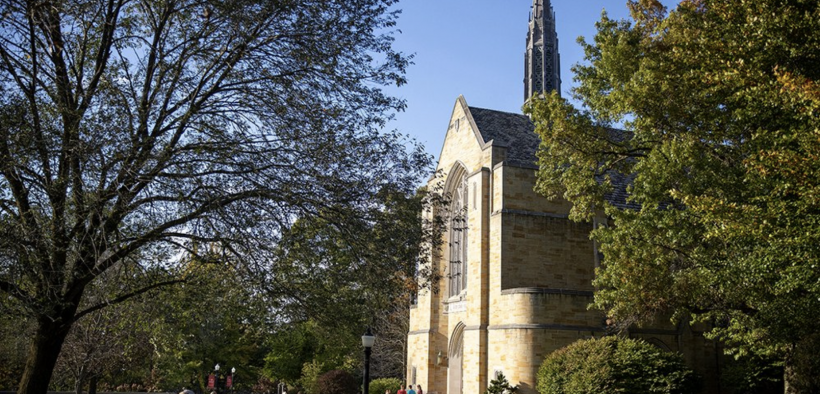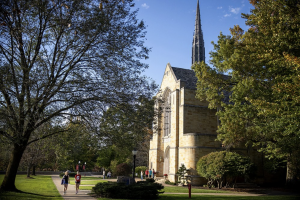Grove City Faculty Say College is Facing a ‘Fight for the Soul’

When Cedric Lewis came to Grove City College nine years ago, he was delighted to teach where his Christian worldview was expected, not just tolerated. But this year, as the Western Pennsylvania school became engulfed in a politicized dispute over critical race theory, Lewis worried its Christian identity could be at risk.

“We are in a fight for the soul of this college,” Lewis, an adjunct professor at Grove City, told Religion News Service. “Are we a Christian college? Or are we a conservative college?”
Grove City has always celebrated traditional values—its rejection of federal funding is a case in point—but more recently has struggled to balance its conservative political identity and broader Christian commitments. After a group of parents raised the alarm about critical race theory infiltrating the school last fall, a committee was set up to investigate and released a report April 20, acknowledging instances of “CRT advocacy” while absolving the school from allegations of “going woke.” It also recommended re-adding “conservative” to the school’s mission statement after it was removed in 2021 over concerns about the term’s shifting political meaning.
Since then, Grove City stakeholders have both celebrated and balked at the report and its listed “remedial actions,” which include enhancing scrutiny of guest speakers, rebranding the Office of Multicultural Education and Initiatives, and replacing an education course accused of inculcating tenets of critical race theory.
Lewis told Religion News Service he’s less concerned about the “remedial actions” than he is about the integrity of the committee’s investigation. The report, issued by a committee with a board-member majority, characterized a “Cultural Diversity and Advocacy” educational course Lewis co-taught as promoting “pop-CRT.” Lewis says he hasn’t thought about CRT since he was in law school decades ago.
“I don’t teach CRT,” Lewis insisted. “I teach Scripture. I teach what I think is a biblical approach to how we deal with our fellow man. We present various sides to our students, and they make up their own minds.”
Other than a class reading list that Lewis says was incomplete, the report didn’t cite evidence of its claims. Lewis added that no committee members visited his class or spoke to his students. They did, however, speak with him in what he felt was less an interview and more an “interrogation.”
“My experience was, they didn’t ask ‘what do you teach?’ But ‘how do you defend being a Christian and supporting CRT?’” Lewis said. “Their minds were already made up, and they were just looking for confirmation.”
Lewis added that he’s the only Black professor at the college, and EDU-290 is often a venue for students’ first conversations with a Black person. “We can’t love our neighbor as ourselves if we don’t know our neighbors,” said Lewis, who added that Christians should be leading conversations about race and racism, not ending them.
Lewis shared his concerns publicly on Twitter and was joined a day later by Jennifer Trujillo Hollenberger, who teaches social work at the school.
“I stand by my convictions and teachings on race in my classroom: one that does NOT indoctrinate CRT—but one that advocates Biblical truth and discusses social science theory to understand disparity in relationship to Creation, Fall, Redemption & Restoration,” she tweeted.
Two new petitions also emerged in recent weeks. The first, an updated version of an earlier petition authored by an alumna, asks the board to reject the report.
“As before, we do not write to endorse or condemn CRT as a legal theory,” the petition, which had 584 signatures as of Monday night, says. “In fact, CRT continues to be a distraction. In their report, the Ad Hoc Committee fell into the trap of viewing any discussion of racism as indicative of CRT.”
A separate petition asks the board to issue a public apology to historian Jemar Tisby after the report characterized inviting him to speak at a 2020 chapel service as a “mistake.”
Petitions have been a popular vehicle for discontent since November, when a group of parents, students, and alumni published an initial petition that accused the school of promoting CRT. Last Friday, the original petitioners posted a new announcement, praising the committee for its rigorous investigation and for vindicating them.
“There is now no doubt about it; CRT has unfortunately gained a foothold at a college that rightly prides itself on its commitment to truth, its Christian worldview, and its conservative values. Now we can focus on what needs to be done to fix this.”
Isaac Willour, a sophomore political science major at Grove City who wrote about the controversy earlier this year in National Review, said it’s a shame Grove City has become a talking point in the larger culture war. He told Religion News Service the debate should have been a campus matter, and its nationalization has only made the campus culture more polarized.
“So much of this has been overblown. The claims of wokeness are overblown. The pushback has been overblown, the pushback to the report is a little bit overblown,” he said. Willour believes most students are upset about the introduction to the report, which includes what he called “speculations” about the definition of critical race theory. In reality, he said, the introduction doesn’t carry weight—it’s the recommendations that will impact the school, and it’s still not clear if or how those will be enforced.
Access to MinistryWatch content is free. However, we hope you will support our work with your prayers and financial gifts. To make a donation, click here.
In an email to Religion News Service, President Paul McNulty said the board is still determining how to address the report at its May 13 meeting. He also clarified that the recommendation to re-add “conservative” to the mission statement is the only item in the report that specifically requires board action.
Lewis believes it’s now up to the board whether the school will prioritize its faith or fall prey to the culture wars. For him, the debate has never been about CRT. It’s about whether the school will uphold biblical principles, including the command to love one’s neighbor. Lewis says the committee failed to do so when they maligned his colleagues’ work—including that of his co-teacher Gina Blackburn, as well as the director of multicultural education and initiatives, Justin Jose, and Chaplain Donald Opitz.
“These are amazing Christian people, and they—we—have not been treated in a supportive, Christian manner,” Lewis said. “That is my biggest disappointment.”
According to McNulty, the dispute presents an opportunity to overcome the divisiveness found in broader culture. “We must follow Christ’s command to love one another and then take up our shared calling to be peacemakers,” he said. “No Christian community will achieve unity of thought, but it can be united in love.”



